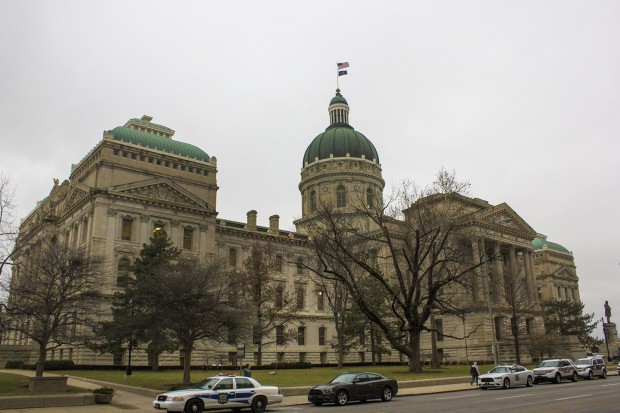Senate Unveils Budget For Education, Increasing Funds To K-12

The Senate unveiled its budget proposal Thursday, showing an increase to K-12 funding. (photo credit: Peter Balonon-Rosen/Indiana Public Broadcasting)
The Senate unveiled its budget proposal for the next two years Thursday, showing higher increases for K-12 spending, compared to the House proposal. Increases include more money for English Language Learners and students living in poverty.
The budget that passed out of the House increased funding for K-12 by 2.8 percent over two years. The Senate proposal increased it by 3.4 percent, which shakes out to $358 million over two years.
A major change from the House budget is the addition of $40 million for complexity grants. Complexity is money calculated for students living in poverty, and during the last budget session, the General Assembly scaled it back so all schools would receive similar allocations. The proposed increase would provide more money to schools with more students living in poverty.
Another change from the House budget is money for teacher performance grants. The House voted to eliminate the program, and instead reinvest that money into general school funding, but the Senate wanted to make sure there was specific money for teacher bonuses.
“We think that extra pay for good teachers is a good thing,” says Senate Appropriations Committee Chair Luke Kenley (R-Noblesville). “We think having a performance funding model that makes sure that that money goes to the classroom teacher and is not swallowed up in the bureaucracy or the administration of the local school corporation is a good thing.”
The Senate bill also reworks the formula that calculates these bonuses. As we’ve reported, the way the bonuses were calculated the last few years was based on ISTEP+ scores, and it created a divide. Teachers in low-income districts received little or no bonus money, and teachers with the same ranking in affluent districts received more than $2,000.
The new formula would make the bonuses more consistent.
Sen. Karen Tallinn (D-Portage) says she is glad to see an increase in various education areas and reinstatement of the teacher performance grant program. But she says Democrats would like to see the money in a different form, not bonuses.
“We think some of this money should actually go to regular teacher salary raises, as opposed to end of the year grants that are off the books,” Tallian says.
The Senate budget also lays out a plan for state-funded pre-K. It is similar to the House plan and would invest $16 million per year for high quality pre-K programs, including money for homeschool programs. But the Senate version expands the program to all 92 counties. Currently, On My Way Pre-K provides pre-K scholarships for families in just five counties.
Kenley says they are expanding the program to the whole state so the Senate will approve the bill, but they would need millions more dollars to serve preschoolers in every county.
The Senate bill also mandates that money allocated to the state voucher program, which gives state dollars for students to attend private schools, be put as a separate line item from general K-12 funding. Kenley says this is a response to those asking for transparency in the program.
House Speaker Brian Bosma, R-Indianapolis, disagrees with this provision of the budget and says voucher spending doesn’t need to be separated in the budget.